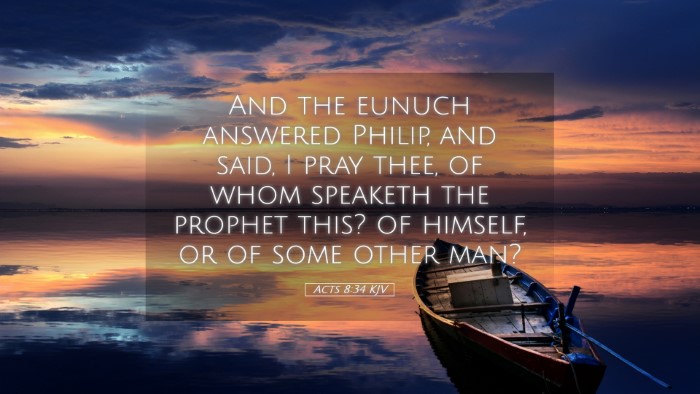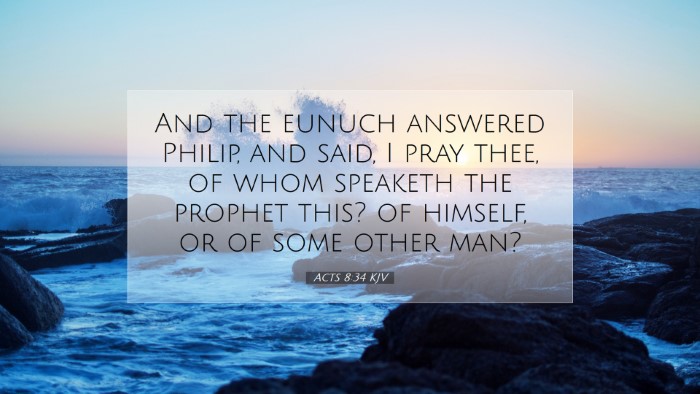Commentary on Acts 8:34
Verse Context: Acts 8:34 is situated within the narrative of Philip and the Ethiopian eunuch, exploring the theme of divine guidance and the spread of the Gospel beyond traditional Jewish boundaries.
Verse Analysis
Text: "And the eunuch answered Philip and said, I pray thee, of whom speaketh the prophet this? of himself, or of some other man?" (Acts 8:34, KJV)
Commentary Insights
This verse captures a pivotal moment in the conversation between Philip and the Ethiopian eunuch. It highlights the eunuch's genuine curiosity regarding the Scriptures he is reading, specifically the passage from Isaiah 53.
Matthew Henry's Commentary
Matthew Henry emphasizes the importance of understanding Scripture in its context. The eunuch, upon reading the suffering servant passage, is perplexed about its application. Henry notes that the eunuch seeks clarity, indicating a heart ready to receive the Gospel. His inquiry shows humility and a desire for truth, which is often essential in the journey of faith.
Albert Barnes' Commentary
Albert Barnes elaborates on the eunuch's desire to understand the identity of the prophet, indicating that even in his estate, he is stricken by a sense of something greater than himself. Barnes remarks on the prominence of the Ethiopian's position—he is a man of high authority yet seeks understanding. The inquiry reflects a recognition of the limits of human wisdom in spiritual matters, showcasing the need for divine elucidation.
Adam Clarke's Commentary
Adam Clarke provides insight into the socio-historical context of the eunuch. He notes that the eunuch's role as a court official likely imbued him with a great deal of worldly knowledge yet left him yearning for spiritual truth. Clarke argues that this indicates the broad reach of God’s grace, accessible even to those outside the usual covenant community. As a seeker of truth, the eunuch's question is pivotal, leading to a fuller understanding of Christ's role as the Messiah.
Theological Implications
The question posed by the eunuch serves as a theological springboard, prompting the narrative towards the revelation of Jesus Christ. The eunuch’s inquiry reflects a universal question regarding Messianic prophecy that resonates across cultures and times.
- Seeking Understanding: The act of seeking knowledge about Scripture illustrates a foundational aspect of faith—inquiring and yearning for truth.
- The Role of Preaching: This passage exemplifies the importance of preaching and teaching, where spiritually sensitive individuals, such as the eunuch, encounter the Gospel through intentional dialogue.
- Inclusive Nature of the Gospel: The engagement with the eunuch emphasizes the inclusive nature of the Gospel, which transcends ethnic and social barriers. It aligns with the early Church's directive to spread the message of Christ to all nations.
Practical Applications
This verse encourages believers in several practical ways:
- Encouragement to Ask Questions: It is crucial for individuals to ask questions about their faith and seek understanding through dialogue and study of Scripture.
- Openness to the Holy Spirit: The narrative illustrates the importance of being sensitive to the leading of the Holy Spirit in personal evangelism and discipleship.
- Affirmation of God's Sovereignty: Recognizing how God orchestrates encounters affirms the belief that He is actively involved in individuals' spiritual journeys.
Conclusion
Acts 8:34 provides a profound moment in the narrative of Philip's ministry, emphasizing the eternal relevance of Scripture and the necessity of understanding its fulfillment in Jesus Christ. The eunuch's question not only reveals his earnest pursuit of truth but also serves as a reminder for all believers to engage deeply with God's Word, seeking clarity and understanding in their own spiritual journeys.


